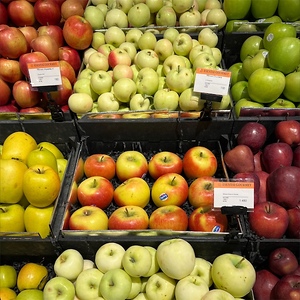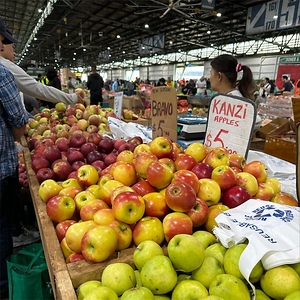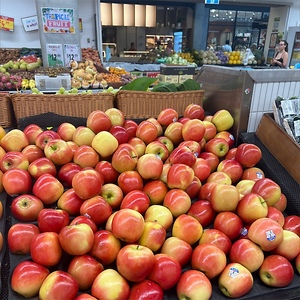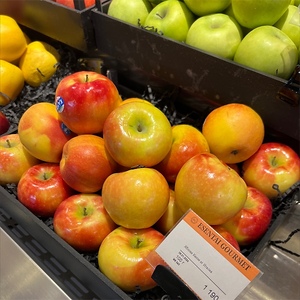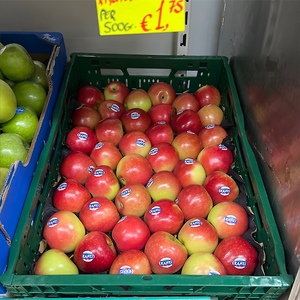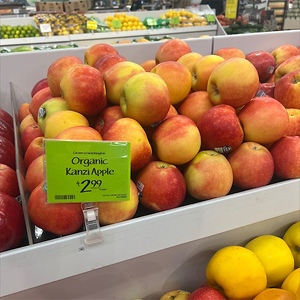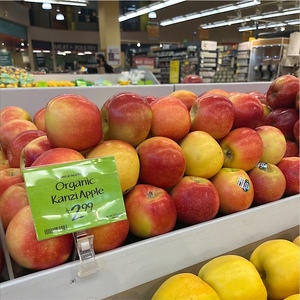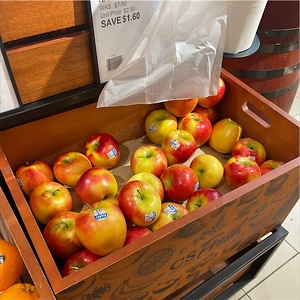


Kanzi® Apples
Estimated Inventory, lb : 0
Description/Taste
Kanzi® apples are a small to medium-sized varietal, averaging 6 to 8 centimeters in diameter, and have a round to conical shape with flat shoulders tapering through a curved center to a narrow base. The variety generally weighs around 200 grams and features a long, slender, and woody green-brown stem extending 1.7 millimeters in length. The apple’s skin is smooth, taut, glossy, and firm, showcasing a golden yellow hue covered in large patches of bright red to red-orange blush. These patches can be translucent to vibrant, enveloping the surface in small lenticels and some ribbing. Underneath the semi-thick skin, the white to ivory flesh is dense, firm, aqueous, and coarse-grained with a crisp, snappy, and lightly effervescent consistency. The flesh also envelops a small central core filled with tiny black-brown seeds. Kanzi® apples are fragrant when ripe and have a balanced, sweet-tart flavor. The apples can be eaten fresh from the tree and are initially sharp, mellowing into sweet, fruity, tangy, citrusy, and subtly grassy nuances.
Seasons/Availability
Kanzi® apples are harvested in the late fall and kept in professional cold storage through the spring. The variety is grown in both the Northern and Southern Hemisphere, also contributing to year-round availability in some markets.
Current Facts
Kanzi® apples, botanically classified as Malus domestica, are a modern apple variety belonging to the Rosaceae family. The late-season, bi-colored apples were developed in Belgium in the 20th century and were initially known as Nicoter. Kanzi® is a trademarked brand name of Nicoter apples, sometimes called Nikita, in select European markets. The apple was chosen as a marketed commercial cultivar in the early 21st century and was released as a dual-purpose fruit favored for fresh eating and cooking. Kanzi® apples are often promoted as an on-the-go, healthy snack food, and it is said the apple received its juiciness from its parent Gala apples and its tangy-sweet taste from Braeburn apples. Kanzi® apples have a firm, hardy nature, allowing them to be exported and shipped long distances, and the trees are somewhat drought tolerant and vigorous. When in season, the fruits can be eaten directly off the tree and last for extended periods, increasing the variety's popularity in retail markets worldwide.
Nutritional Value
Kanzi® apples are a source of fiber to regulate the digestive tract, potassium to balance fluid levels within the body, calcium to protect bones and teeth, magnesium to control nerve functioning, and antioxidants to reduce inflammation while protecting the cells against free radical damage. The apples also provide vitamin C to strengthen the immune system and reduce inflammation, vitamin A to maintain healthy organ functioning, iron to develop the protein hemoglobin for oxygen transport through the bloodstream, and other nutrients, including zinc, vitamin K, vitamin E, boron, and copper.
Applications
Kanzi® apples have a balanced, sweet-tart flavor suited for fresh and cooked preparations. The variety is primarily eaten out of hand and savored for its crunchy, juicy nature. Kanzi® apples can also be shredded into slaws, chopped into salads, diced into pasta side salads, or layered into overnight oats and parfaits. The apples can also be sliced and added to burgers, paninis, and grilled cheeses, cut and topped over bruschetta, or sliced and served with dips such as nut butter, caramel, or melted chocolate. Try blending Kanzi® apples into smoothies or juices as a refreshing beverage. In addition to raw preparations, Kanzi® apples also hold their shape when heated and can be used as a topping over flatbread, baked into pancakes, cooked into apple cheddar rolls, or diced and used as a garnish over tacos. Kanzi® apples are also incorporated into cheesecakes, tarts, pies, dumplings, and crisps, stirred into risotto, baked into zucchini bread, or cooked into soups and curries. Beyond culinary dishes, the variety can be simmered into syrups, jams, chutney, and other preserves as a sweet and tangy condiment. The apples can also be thinly sliced into rings and dried or baked as a snack. Kanzi® apples pair well with cheeses including gorgonzola, brie, goat, halloumi, and feta, fruits such as figs, grapes, melons, and strawberries, meats including duck, pork, beef, and turkey, fish, and nuts such as almonds, walnuts, and pecans. Whole, unwashed Kanzi® apples will keep for several weeks when stored in a cool, dry, and dark place such as a cellar or refrigerator.
Ethnic/Cultural Info
Kanzi® is a marketing name chosen for Nicoter apples grown by licensed orchards worldwide. The name Kanzi means “happy treasure” or “hidden treasure” in Swahili. It is unknown why the Swahili name was chosen as the branded moniker for the apples. The name Nicoter was given to the variety by its breeder, Johan Nicolai, in Belgium.
Geography/History
Kanzi® apples were developed in Belgium in the late 20th century and were initially known as Nicoter. The variety was created by scientist and breeder Johan Nicolai in partnership with Leuwen University in Sint Truiden, Belgium, and was born from a cross between Braeburn and Gala apples, also known as Kidd’s D-8 apples. Interestingly, another apple variety was developed from the same parentage. Jazz™ apples were bred from Gala and Braeburn apples in New Zealand also in the late 20th century, but despite their shared timeframe and parentage, these two apples were created independently from each other. In the early 21st century, Greenstar Kanzi Europe and Better3Fruits selected Nicoter apples and rebranded them as a premium commercial variety. The apples were named Kanzi® and were filed for a plant patent in 2002, approved in 2006 under United States Plant Patent USPP 17201P3. Kanzi® apples were released to commercial markets in Europe in 2006 and were widely grown in the Netherlands by 2010. Since the date of approval, the patent has expired in 2023, but Kanzi® apples have remained a popular commercial apple, often labeled as one of the second-largest branded apple varieties worldwide. Kanzi® apples are licensed by the European Fruit Cooperation, EFC, and in 2010, the cultivar was planted in Australia and sold seasonally in the United States in 2014. Today, Kanzi® apples are grown worldwide in Europe, primarily in South Tyrol, Italy, the Netherlands, Belgium, Germany, and England, Australia, South Africa, and the United States.
Recipe Ideas
Recipes that include Kanzi® Apples. One
| Be |
|
Apple Bircher Muesli |
| Chew Town |
|
Kanzi French apple and Thyme Tart |
| Fast Ed |
|
Chocolate Kanzi Cake |
| Kanzi Apples |
|
Kanzi Cake |



